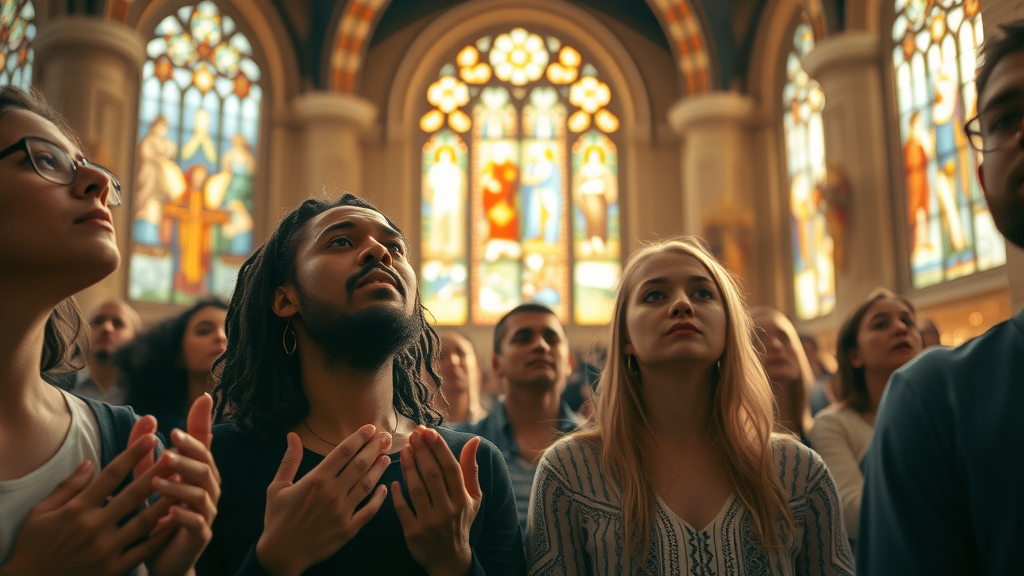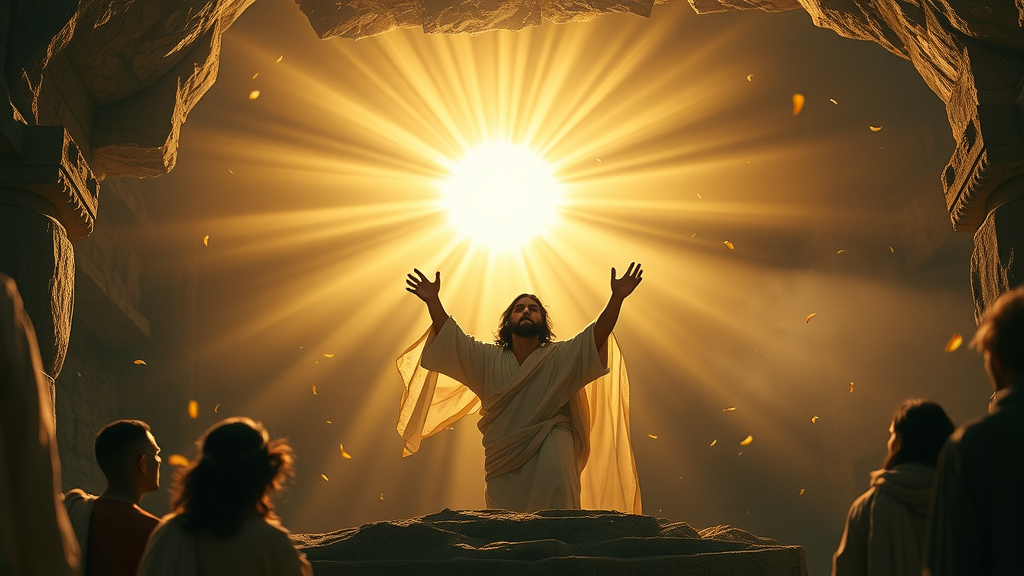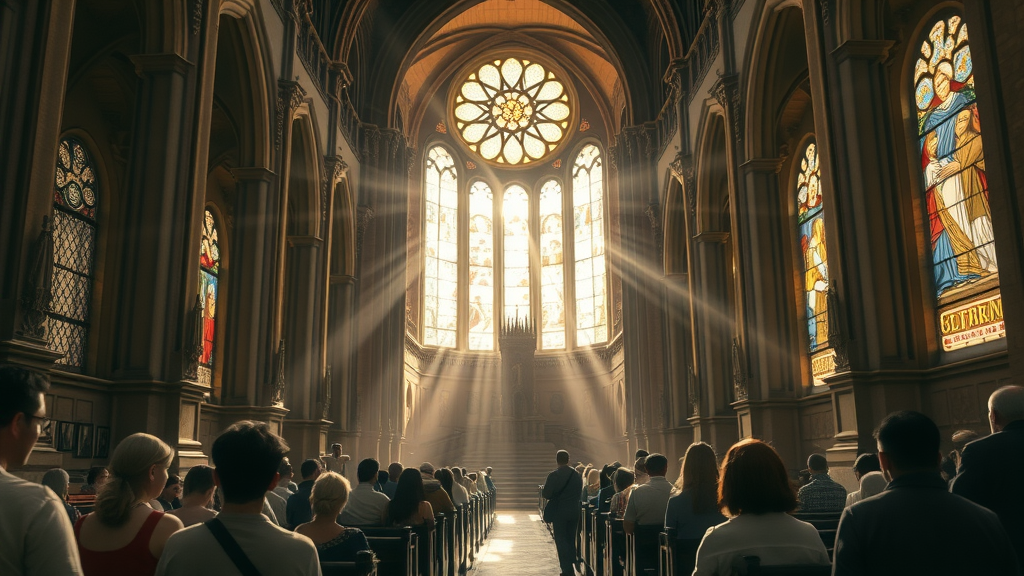"Have you ever questioned if spiritual experiences are truly part of Christian life, or is supernatural Christianity just a myth?"
What you’ll learn: This article will challenge your assumptions about supernatural Christianity , guide you through life-altering true stories, and clarify what the Bible really says about miracles, the Holy Spirit, and faith for modern day Christians seeking authenticity and power.
Exploring the Essence of Supernatural Christianity: Challenging the Boundaries of Faith

- Defining supernatural Christianity—What sets it apart?
- The intersection of faith, miracles, and daily life
- How historical church debates define supernatural Christianity
Supernatural Christianity isn’t just about believing in God—it’s about experiencing faith beyond the ordinary, where the boundaries of the natural realm are stretched by encounters with the spiritual. Unlike a faith limited to intellectual beliefs or good morals, supernatural Christianity insists that the power of God is present and active, revealing signs, wonders, and the life-lifting presence of the Holy Spirit in everyday life. This approach unites the Christian faith with a living expectation of miracles and divine interventions, moving from a passive tradition to a vibrant supernatural life.
Historically, Christian leaders have debated whether miraculous gifts and experiences were reserved for the early church or are meant for modern day Christians as well. Key questions arise: Is supernatural Christianity just something for the apostles, or is it the true core of faith intended for all who follow Jesus Christ? When we look at church history and modern day testimonies, we see that the personal aspects of faith—such as encountering the Holy Spirit or witnessing healing—have always set Christianity apart from mere religion. These supernatural aspects, when combined with genuine personal transformation, define a faith that is alive, contemporary, and compelling.
In practical terms, this means the case for Christianity can’t be built solely on teachings and traditions. Instead, it’s reinforced by the ongoing activity of the Holy Spirit, where miracles and spiritual gifts break into daily life, often in ways that defy logical explanation. Skeptical or not, one cannot deny the impact of countless believers who have found their lives redirected by spiritual experiences. These real-world examples challenge us to reconsider whether faith without the supernatural is really Christianity at all.
Personal Encounters: How Supernatural Christianity Transforms Belief
Firsthand Accounts: Stories That Defy Explanation
"The Holy Spirit’s tangible presence reshaped my convictions and introduced a new dimension to my Christianity."
Stories from people whose lives have been radically changed by supernatural encounters are at the heart of supernatural Christianity. Across continents and denominations, believers report moments when God's power broke through the ordinary—healings from illnesses doctors deemed impossible to cure, answers to prayer that came with uncanny timing, and even moments of prophetic insight that guided entire communities. These accounts are more than just human interest stories; they’re evidence that the spiritual realm is intertwined with the natural, making the activity on this service of faith something transformational.
Often, these encounters arrive during personal crises or turning points, revealing that the activity of the Holy Spirit is not limited to biblical times but is a living reality for those open to His movement. From quiet moments of peace in prayer to dramatic interventions on a "crime scene" of broken relationships or shattered hope, these supernatural experiences affirm the promises explained in the Bible. For example, some believers recall the unmistakable peace that settled upon them during grief or disaster—a peace the world could not provide. Others describe miraculous provisions or healings that defied every expectation. Each story, unique in its details, points to one truth: supernatural Christianity is about more than what can be explained away or rationalized.
The fact that these stories are as diverse as the interests and personal backgrounds of believers, yet consistently point to the involvement and intimacy of a loving God, speaks to the authenticity of supernatural Christianity. For many modern day Christians, these experiences serve not only as encouragement but as anchors for faith, providing tangible assurance that God still works today—and that the supernatural life is not a thing of the past but an invitation for all who believe.
Key Moments: The Role of Miracles in Authentic Faith

Miracles are the milestones of the supernatural life, reminding us that faith isn’t about what we can control, but about trusting in a God who can—and often does—intervene. Authentic faith is shaped by these key moments, whether they come through dramatic healings, sudden turns of fortune, or encounters with spiritual beings as described in the Bible. What sets these experiences apart is their impact: they don’t only provide physical or emotional relief, but often transform our understanding of who God is and our place in the created universe .
Miracles often push believers out of their comfort zones, asking them to believe not just intellectually but experientially. Whether it’s a modern day healing or a word of prophecy that changes the direction of someone's life, these moments serve as reminders that the supernatural aspect of Christianity isn’t just for a select few. In fact, many stories from ordinary people—parents, workers, students—show that the presence of the Holy Spirit and Jesus Christ is available to all who seek Him.
For skeptics, miracles can seem like wishful thinking or coincidences, but for those who’ve lived through them, the evidence is profound. It’s as if God leaves a "crime scene"—a lingering sense of awe, gratitude, and changed hearts. In support of the purposes explained in Scripture, these miraculous moments propel believers to share their faith courageously and live with a hope and expectation that breaks the mundane cycle of everyday life.
Understanding the Biblical Evidence: What Does the Bible Say About Supernatural Christianity?
| Biblical Miracles | New Testament References | Theological Implications |
|---|---|---|
| Jesus’s Resurrection | John 20:1-18 | Foundation of Christian hope and supernatural power |
| The Holy Spirit Descends | Acts 2:1-4 | Empowerment of believers for supernatural works |
| Healing Miracles | Matthew 9:20-22 | Compassion and divine authority in action |

The Bible is filled with stories and teachings about supernatural Christianity. From the resurrection of Jesus Christ—which is considered the ultimate miracle —to the descent of the Holy Spirit at Pentecost, Scripture anchors its message in supernatural events that have shaped both history and the lives of millions. The power of God is not depicted as abstract, but as tangible and transformative, breaking into the natural realm and overturning expectations.
Biblical miracles, whether it be healings, prophetic utterances, or supernatural deliverances, form the foundation of the Christian story. Far from being isolated "crime scenes" in history, these miracles point toward a living God whose activity on this service continues in the lives of believers today. When analyzing the New Testament, the active presence of the Holy Spirit and the accounts of both ordinary and extraordinary people show that supernatural Christianity is not a departure from faith, but its heartbeat.
The theological implications are vast. The resurrection, for instance, isn’t just a historical curiosity; it’s the cornerstone of hope, a declaration that the laws of the natural realm are subject to the One who made God known in flesh. When combined with other information—such as modern day testimonies and the unbroken tradition of miracles—they build a compelling case for Christianity rooted in supernatural power rather than mere philosophy or ritual.
The Case for Christianity: Is Supernatural Christianity Essential to Faith Today?
Historical Perspectives and Contemporary Relevance
"Any faith that ignores the supernatural narrows the scope of what Christianity claims to be."
From the earliest church fathers to modern day theologians, there has been ongoing debate about the place of supernatural Christianity in faith. Throughout much of church history, movements that sought to deny or downplay miracles either lost their vibrancy or failed to attract new believers. On the other hand, revivals and global movements ignited whenever people rediscovered the Holy Spirit’s gifts and the power of signs and wonders.
Today, the case for Christianity in a skeptical age rests as much on demonstration as argument. While intellectual defenses and philosophical arguments remain important, it is the supernatural aspect—evidence of a real and active God—that continues to draw people into deeper exploration. Testimonies of changed lives, miraculous healings, and prophetic guidance confirm that the Christian faith is not a relic but a living encounter. For the modern day Christian, choosing to embrace supernatural Christianity often leads to a more passionate and purposeful faith journey.
The contemporary relevance of supernatural Christianity can also be seen in how it bridges the gap between head knowledge and heart transformation. In a world both fascinated and overwhelmed by the unexplained—from "tv shows" like Supernatural to genuine spiritual hunger—the church has an unmatched opportunity to offer the real thing. Instead of mere entertainment or imitation (as seen in shows about Sam and Dean or the fantasy worlds of Gibson Les Pauls), authentic supernatural experiences provide hope and a sense of destiny, even amid rapidly shifting cultural values.
Debate: Signs, Wonders, and the Modern Church
Despite overwhelming personal accounts and biblical backing, the place of signs and wonders in today's church remains contested. Some argue that miraculous gifts ceased after the apostles, while others contend that the Holy Spirit’s activity on this service continues unabated in every generation. This divide has shaped denominations, written church policies, and even influenced church architecture and worship practices.
Yet, empirical data shows that churches and communities that welcome the gifts of the Holy Spirit are often marked by rapid growth, deeper discipleship, and rejuvenated worship. Critics may see miracles as distractions or sources of false hope, but for many, they are gateways into a more dynamic faith. This debate ultimately forces every believer to ask: are we content with a faith that denies the supernatural, or will we pursue a deeper experience of the God who created the universe and still moves miraculously today? Engaging this question is part of the ongoing case for Christianity’s relevance in the modern day.
What cannot be denied is the deep spiritual hunger in today’s world—a hunger for authentic encounters and a break from routine. Supernatural Christianity, with its focus on the unpredictable and be transformative, answers this hunger more powerfully than any philosophy, theology, or "tv show" ever could, making it not just relevant but essential for the modern day believer.
The Holy Spirit: Catalyst for Supernatural Christianity in Action
Gifts of the Holy Spirit: Empowering Everyday Believers

- Prophecy: Speaking inspired truth
- Healing: Physical and emotional restoration
- Discernment: Distinguishing divine influence
The Holy Spirit is the driving force behind every supernatural experience in Christianity. More than a mystical presence, the Holy Spirit equips everyday believers with spiritual gifts—tools for bringing hope, healing, and truth to a broken world. These gifts, like prophecy, healing, and discernment, aren’t reserved for the spiritual elite. They’re available to anyone who is willing to step beyond comfort zones and trust God’s leading.
This empowerment is what makes supernatural Christianity both unique and accessible. Testimonies abound of individuals who stepped out in faith to pray for someone, only to witness a healing miracle or deliver a word of encouragement that changed everything. These moments have served as the "support of the purposes" outlined by Jesus Christ—to love, serve, and reveal God’s reality. Whether it’s a quiet prompting or a dramatic display of miraculous power, the Holy Spirit breathes supernatural life into every believer, building up the church and impacting the world.
For believers wondering about the "purpose explained" behind spiritual gifts, the Bible teaches that these manifestations are for the common good—to strengthen faith, build community, and point people unmistakably toward God. The activity on this service is not about spectacle or self-promotion, but about seeing God’s purposes fulfilled in real time. For those open to His leading, the Holy Spirit offers courage, clarity, and compassion far beyond our natural abilities.
Challenges and Controversies: Discerning Authentic Supernatural Christianity

With the rise in stories about miracles and spiritual gifts, valid concerns about authenticity and discernment arise. Human nature, combined with genuine spiritual hunger, sometimes blurs the line between true supernatural Christianity and emotionalism or even deception. The Bible, however, urges believers to test every spirit and seek confirmation from Scripture, leaders, and the witness of the Holy Spirit.
False claims or over-emphasis on miraculous events can erode trust and distract from the essential message of the Gospel. For every genuine account, there are also reports of fabricated stories or misunderstood spiritual encounters. Discernment—an essential gift of the Holy Spirit—helps believers navigate these challenges. The early church was no stranger to controversies either; yet, the solution was never to abandon the supernatural, but to seek a balance of faith, evidence, and wise leadership.
Modern day Christians are called to hold both truth and power, never accepting a counterfeit but always remaining open to God’s unexpected ways. The case for Christianity, then, depends not on sensationalism, but on humility, wisdom, and a willingness to judge every supernatural experience by its fruit—the real transformation it brings to lives, churches, and communities.
Interested in seeing the power of supernatural Christianity for yourself? Watch moving testimonies and interviews with people who have experienced the miraculous firsthand. Their stories bring the principles in this article to life, showing that the activity on this service is as vibrant today as ever. (Search online for reputable Christian testimony channels for inspiring media.)
Hearing personal stories or engaging with faith-based "text to speech" media about supernatural encounters can deepen your faith and make biblical truths feel all the more real, complementing what you've read and learned so far.
Many believers find these videos to encourage deeper spiritual hunger, sparking questions and desires to seek more of God’s presence and supernatural activity in their own lives.
People Also Ask: Is supernatural based on Christianity?
The TV show "Supernatural" is not based directly on Christianity, though it draws from many Christian symbols and concepts—like angels, demons, and biblical references. The show features fictional characters, like Sam and Dean, investigating paranormal activity. While it sometimes borrows elements from the Christian worldview, its portrayal of the supernatural is primarily for entertainment and does not reflect authentic Christian doctrine or experiences. Christians interested in the supernatural will find truer insights in biblical accounts and the lives of saints through history rather than a tv show aimed at a broad popular audience.
For those truly exploring the supernatural, it's important to distinguish between media fantasy and the supernatural life taught and lived out in the modern day Christian faith—a faith rooted in the real activity of God and the power of the Holy Spirit.
As a result, the "crime scene" mysteries explored by Sam and Dean on the TV show, though entertaining, diverge significantly from the purposes explained and realities of the Christian faith.
People Also Ask: What does the Bible say about supernatural?
The Bible contains extensive evidence for the supernatural. From the creation of the world to the ministry of Jesus Christ and the early church, supernatural events like miracles, healings, prophecy, and angelic appearances are common. In both Old and New Testaments, the supernatural is presented as a natural consequence of God's involvement in human life. Believers are encouraged to seek and expect God's supernatural intervention—not to chase after miracles for their own sake, but to see the Lord's power and glory revealed.
Passages about the resurrection, the descent of the Holy Spirit, and the gifts given to believers are strong support of the purposes explained throughout scripture. The Bible warns against counterfeits but celebrates genuine supernatural experiences as confirmation of God’s covenant and presence with His people.
Ultimately, the Bible places the supernatural activity of God at the center of the faith journey; without it, Christianity would be reduced to philosophy or ritual, which is why the supernatural aspect is so vital to the Christian faith.
People Also Ask: What is an example of supernatural in Christianity?

A primary example of the supernatural in Christianity is the event of Pentecost as described in Acts 2:1-4, when the Holy Spirit descended upon the disciples and they spoke in other languages. This event shows the power of God breaking into the natural realm. Other examples include Jesus's miracles (healing the sick, raising the dead), the resurrection, and miraculous signs and wonders performed by believers throughout church history.
Modern day, Christians continue to witness healings, prophetic words, and dramatic answers to prayer—confirming that the supernatural life is not just historical but present. Whether through physical miracles or spiritual gifts, these examples serve as strong evidence for the ongoing activity on this service of the Holy Spirit.
Such events are recorded to build faith, edify believers, and draw attention to the reality that God is at work—confirming the claims of Christianity with signs that follow, as explained in this notice of faith and practice.
People Also Ask: Is supernatural a good show for Christians?
"Supernatural" is a popular TV show, but its themes, while entertaining, are not based on Christian doctrine and can blur the line between fiction and faith. For some Christians, watching "Supernatural" can be fun if approached with discernment, but it should not shape one’s theology of the supernatural or spiritual realm. Real supernatural Christianity, as described in Scripture and evidenced by the Holy Spirit’s work, is far deeper and more fulfilling than what’s depicted in such shows.
If you choose to watch, it’s important to remain rooted in biblical truth, understanding the difference between storytelling and genuine spiritual reality. Many believers prefer to focus their attention on testimonies and media that affirm the real power and love of God, rather than risk being misled by inaccurate or sensational depictions of spiritual beings and the supernatural.
Ultimately, the interests and personal aspects of your entertainment choices should support, not undermine, your spiritual health and your understanding of what it means to live a supernatural life.
Why Supernatural Christianity Still Matters: Key Takeaways and Final Reflections
- Supernatural Christianity insists that faith is not confined to intellectual belief alone.
- Personal experience and biblical history affirm the ongoing work of the Holy Spirit.
- Discerning authentic supernatural experiences is vital for spiritual health.
Supernatural Christianity continues to offer hope and transformation in a world longing for more than routine. When combined with other information—like personal testimonies, biblical teachings, and historical evidence—it builds a compelling case for Christianity that is truly life-changing.
Embracing the supernatural life isn’t just about seeking miracles; it’s about trusting in the God who invites us into deeper faith, real encounters, and the kind of love and power that changes everything.
Take your journey further by exploring video teachings and documentaries that reveal how the Holy Spirit shapes daily living for ordinary believers. These resources show the endless possibilities of living life empowered by God’s presence, and provide practical steps for experiencing the supernatural aspect of the Christian faith.
Personal video stories and in-depth interviews with modern day Christians can open your mind to the impact of the Holy Spirit—beyond what words alone can describe.
Look for trusted ministries online that offer insights into the gifts and fruit of the Holy Spirit, as well as stories of transformation that confirm the ongoing support of the purposes set out in Scripture.
Common Questions About Supernatural Christianity
- How can Christians discern authentic supernatural experiences? Genuine supernatural experiences align with biblical principles, produce good fruit, and point to Jesus Christ. Seek wise counsel, confirm with Scripture, and remain open yet discerning.
- What is the purpose of miracles today? Miracles serve to encourage faith, demonstrate God’s compassion, confirm the message of Jesus, and meet needs that cannot be solved by human effort alone.
- Are all Christians called to experience the supernatural? Yes, while experiences may differ, every believer is invited to walk with the Holy Spirit, expect answers to prayer, and live with an openness to God’s miraculous work.
Embracing Supernatural Christianity: An Invitation to Deeper Faith
Don’t settle for ordinary faith. Embrace supernatural Christianity and open yourself to God’s unexpected power and love—step into a life transformed from the inside out.
Ready for more? Seek the Holy Spirit, expect the miraculous, and allow authentic encounters to define your journey of faith—your supernatural life starts now.
Supernatural Christianity emphasizes the active presence of the Holy Spirit and the manifestation of spiritual gifts in believers’ lives. This perspective is deeply rooted in the belief that God’s power is not confined to the past but continues to operate today.
For a comprehensive understanding of this topic, consider reading “Charismatic Christianity,” which explores the global movement that highlights the work of the Holy Spirit and spiritual gifts as integral to daily Christian life. ( en.wikipedia.org )
Additionally, “A Supernatural Faith” by R.C. Sproul delves into the necessity of the supernatural in Christianity, arguing that without it, the faith loses its essence. ( ligonier.org )
These resources provide valuable insights into the ongoing relevance and transformative power of supernatural elements in Christian faith.
 Add Row
Add Row  Add
Add 


Write A Comment